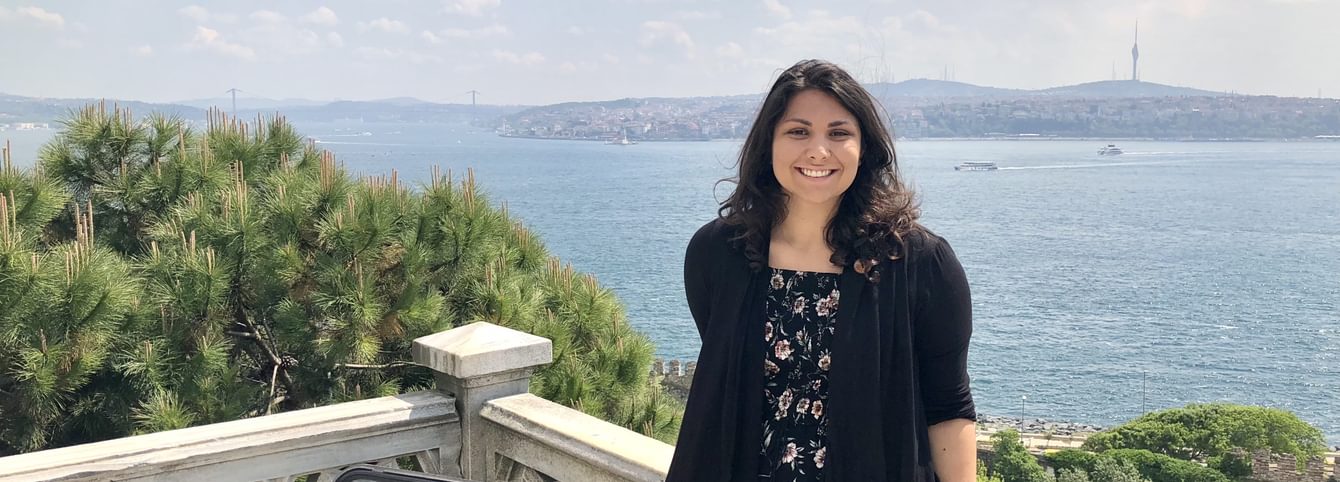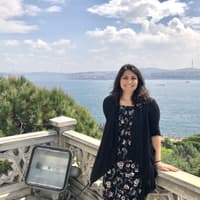Lauren Palmieri
Lauren Palmieri is an alumna of the 2021 CLS Turkish Program hosted virtually by the TÖMER Institute in Bursa, Turkey. Lauren graduated from James Madison University with bachelor's degree in history with an emphasis in Middle East history. Lauren is currently conducting research on female publications and periodicals at the National Library of Kuwait as a Fulbright Scholar.
Learning Together
My most cherished memories from the CLS Program include meeting with my language partner, Ekrem. Not only did these meetings provide the opportunity for me to practice my Turkish in a more relaxed setting, but they also allowed me to feel more connected to my host institution and culture, even in a virtual setting. What I enjoyed most about meeting with my language partner was how quickly our conversations would derail in the most amusing ways. We usually began our meetings with a “plan” to practice the grammar. But we typically ended up talking about everything else from Turkish soap operas to zodiac signs to whatever mishaps happened in our lives that week. We even spent one meeting over Facetime in the car while I was driving down to Virginia for a belated graduation ceremony. We often laughed as I on occasion stumbled my way through Turkish. It was incredibly rewarding to have the opportunity to expand my Turkish vocabulary beyond traditional classroom methods. These meetings kept me engaged with the language and equipped me with new sets of words and phrases to use in day-to-day conversations.
Sharing Hometown Cooking
While I was not able to visit Turkey during the CLS Program, I found that my language partner, professor, and I were eager to share about our hometowns and local cuisines. We spent some time talking about food and how the green peppers used in Turkey are different than those used in America. We learned how this discrepancy meant that the menemen, a popular Turkish dish with eggs, tomato and green peppers, we made from our hometown kitchens would never be quite as tasty as in Turkey. I shared my grandmother’s pumpkin bread recipe with my professor, while he taught us about making dolma, stuffed grape leaves. For any virtual video projects, I’d persuade whichever friends I had around me to join in, rehearsing restaurant settings and pretending to order takeout over the phone. While my friends hadn’t had any previous exposure to the Turkish language, they were eager to participate and learn a few words. Even in a remote setting, I constantly found myself amongst opportunities to share my experiences and deepen my understanding of Turkish culture.
Overcoming Language Learning Hurdles
One of the biggest hurdles with beginning Turkish was adapting to the order of the sentences. For example, the sentence “the woman read the book” would technically be ordered as, “the woman the book read.” Because of this switch, I often found myself pausing mid-sentence to rearrange the words before speaking. Sometimes I would re-order the sentence in English before then translating the words into Turkish. But, what I noticed, as many other students had, was that we found our language skills improving when we spoke without fear of making a mistake. We embraced all opportunities to speak as much as possible, not allowing ourselves to be limited by fear of speaking in the wrong order. The different sentence structures became more familiar over time. As with any language, it is important that you find topics that interest and excite you. My language partner and I spent countless meetings discussing Turkish soap opera, Muhteşem Yüzyıl, because of my love for Ottoman history. By focusing on topics you’re excited about, practicing the language feels less like studying for an exam and more like having a conversation amongst friends.
Words of Advice
I can’t highlight enough how rewarding my CLS experience has been. Even in a virtual setting, I felt immersed in the language and I watched my Turkish skills soar to new heights I never thought possible. I was fortunate enough to visit Istanbul in the fall following my program. I had previously been to the city, but my Turkish speaking skills were minimal then, I was barely able to ask how much something costs. Experiencing Istanbul again while being able to communicate in Turkish transformed my experience and gave me new insights into the culture. I found myself sitting down for tea with shop owners I had met on the street. We would spend an hour or two engaging in conversations about Ottoman history, the rise of capitalism, and contemporary politics both in Turkey and in the U.S. My second visit to Istanbul granted me a more nuanced view of Turkish culture because of my improved language abilities. CLS will transform how you engage with the language and the culture far after the program’s end date.



